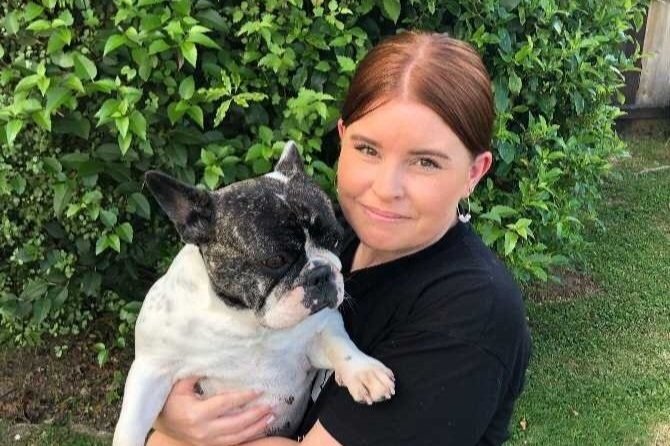Celebrating our awesome wāhine working in tech
The Digital Future Aotearoa team is made up of some amazing wāhine, many of whom never thought they’d end up working in tech. Everyone’s journey is unique, although we often share challenges. This International Women’s Day we take some time to celebrate our wāhine, share our challenge stories, words of encouragement and advice, in the hope that one day we will find ourselves in a gender equal world, free of bias, sterotypes and discrimination. A world that’s diverse, equitable and inclusive. Let’s all #BreakTheBias
Bronnie
“Find your cheerleaders, mentors and supporters, people to bounce ideas off, use as a sounding board. Know to offer and be available when they need to lean on you.”
Have you encountered Imposter Syndrome? Have you been able to overcome it?
Imposter Syndrome plagued me during my pilot career - the environment is a very competitive one, you’re constantly measuring your success against others and in perpetual movement towards the next thing you must do to ‘be a real pilot’. This was not an environment I felt as though I could thrive, so I took on other challenges outside aviation. It hasn’t been until recently that I’ve realised I no longer have Imposter Syndrome, and it’s thanks to a supportive team working together on inspirational kaupapa that has seen me kick it.
Do you have any resources/articles of wisdom to share?
Seeing what Elina and the Storyo team are doing to share stories and celebrate our peers is really inspiring, check them out https://www.storyo.co.nz/
How can you actively call out gender bias, discrimination and stereotyping each time you see it?
This is something I’m still learning to do! My usual tactic is to say (and it’s great in these Zui times we live in) “Sorry I didn’t catch that, are you able to say it again?” which forces the speaker to have the opportunity to consider rephrasing their comment, and possibly take stock of what it is they just said.
As a leader, if one of my team came to me with an observation, I would have no issues calling a spade a spade and having that potentially awkward conversation with whoever, or removing ourselves from the situation or partnership entirely. It can be difficult, but it needs to be done.
How has your mana been enhanced?
Through encouragement, support and the empathy of knowing that we’re all making it up as we go along. Find your cheerleaders, mentors and supporters, people to bounce ideas off, use as a sounding board. Know to offer and be available when they need to lean on you.
Siobhán
“We need a strong connection to our own mana and to value ourselves in order to enhance the mana of others.”
How can you actively call out gender bias, discrimination and stereotyping each time you see it?
I feel like the first and most important step is to recognise that we all make mistakes - a bit of self reflection goes a long way when the desire to call someone out arises! It’s crucial to address the anger and emotional reaction we experience before opening up a conversation with the person, otherwise we’re left feeling drained and there’s not much hope for positive change in behaviour.
How has your mana been enhanced?
By surrounding myself with friends, whānau and colleagues who care deeply about their own mana! When we care about our own mana - our self-determination, strength, wairua and well-being, we have a greater sense of belonging, of social responsibility and care for those around us, and our collective mana is enhanced.
How do you enhance the mana of others?
As I mentioned before, we need a strong connection to our own mana and to value ourselves in order to enhance the mana of others. Foster a healthy, nurturing environment where people feel valued, empowered and have the confidence to build new skills for a better future.
Dani
“Our environment and societal norms dictate what we think is normal and abnormal. The world is forever evolving, so if we start now, by the time you’re older there hopefully will not be a bias to break”
Have you encountered Imposter Syndrome? Have you been able to overcome it?
I have encountered Imposter Syndrome. I often encounter it during big opportunities that I get. I always have Imposter Syndrome when I am in an Internship and even this job (my role at Digital Future Aotearoa). It really has to do with my age (I’m 19) and experience. Comparing myself to my work colleagues and what I have to offer versus them and the “what if” I can’t do the job “well”.
The way I overcame this was by simply just biting my tongue and doing the jobs I needed to do. I go by this common quote, “mind over matter”, it means you can do anything you put your mind to and it’s all about mind muscle. I have, so far, found this to be very true. When you just do the job you’re asked to do, 9 out of 10 times, you realise it wasn’t too bad and that you are capable of more than you think. And I always remember I can communicate anything, even if it’s just my thoughts. I can always ask questions, I can always ask for help, I can even communicate how I’m feeling, what the consequences are for me if I don’t do the job correctly, or even if there is a “correct” way (sometimes I am assigned creative things).
What would you say to the younger generation to help them break the bias?
What world do you want to live in? Do you want to live in a world where most of the jobs are dominated by men? Do you want to live in a world where you feel like you aren’t “meant” to be in a certain job? It all starts with us now, here, in the present. If your generation can normalise women in every aspect of life, then you’ll be living in the world you want to live in. Our environment and societal norms dictate what we think is normal and abnormal. The world is forever evolving, so if we start now, by the time you’re older there hopefully will not be a bias to break. And think about your children. What world do you want them to live in? Do you want your daughter to be mistreated because of her gender? At the end of the day, we are all human. We all do human-like things regardless of gender, including learning and working. So women, just as much as men, are capable of the same things.
Do you have any resources/articles of wisdom to share?
“Mind over matter”. You can do ANYTHING you put your mind to.
A book that helps me keep motivated and inspired everyday is called “Daily mantras to ignite your purpose” by Lisa Messenger. It contains 365 doses of inspiring wisdom, one for each day. Each page is dated with every day of the year and I read the dedicated page per day. Each page also includes the author's take of the quote and an affirmation for the day.
Today’s one for example (March 2nd 2022) is: “Stories aren’t more empowering if you have perfect skin. You don’t lack as much as you think.” So true.
I bought mine off of PepperMayo.
Becks
“The key for me is acknowledging that not everyone is at their best all the time and no-one is perfect”
Have you encountered Imposter Syndrome? Have you been able to overcome it?
Every day! This is something I have an ongoing struggle with, but I’ve definitely made huge strides in the battle against Imposter Syndrome. The key for me is acknowledging that not everyone is at their best all the time and no-one is perfect. A lot of the fuel for the fire of Imposter Syndrome is internal and once you start to believe that you are good enough to be where you are, people around you aren’t better or worse than you, and that your self worth and your work results should be separate, Imposter Syndrome can feel more manageable.
Do you have any resources/articles of wisdom to share?
I am big on reading non fiction and I would highly recommend Wordslut: A Feminist Guide to Taking Back the English Language, Know My Name - Chanel Miller, Maybe You Should Talk to Someone - Lori Gottlieb and if a full book is a bit much, or you’re more of a visual person https://www.instagram.com/lizandmollie. And Ologies by Alie Ward for a podcast to help you feel smart and keep you engaged in the world without doomscrolling or becoming bogged down.
How can you actively call out gender bias, discrimination and stereotyping each time you see it?
For me, the key is to be compassionate but firm. If someone you know personally says something that you aren’t comfortable with it can sometimes be pretty scary to speak up because you want to maintain the relationship, but if you don’t say anything they might not realise that what they’re saying is offensive or biased and keep doing it. I always err on the side of caution - say something the first time it comes up, make it clear why what they said hurt my feelings, be willing to have a conversation (not a fight!) about it, and ask them to stop using that word/phrasing. They’re usually grateful that you brought it up rather than let it hurt you and fester, and you can continue on having a great relationship - whatever form that relationship takes! If this is too scary and you want a less confrontational way to deal with it, saying you don’t understand and asking someone to explain a joke or what they’ve said works well - once someone has to explain why a sexist or racist joke is funny, they usually realise it’s not.
Eva
“We are not on this waka (boat) alone - so next time you’re feeling like an imposter, remember that you carry your tīpuna with you who give you strength.”
Have you encountered Imposter Syndrome? Have you been able to overcome it?
As a proud and often staunch (when the occasion calls) wāhine Māori, throughout my professional career I’ve found myself in many spaces where I have to speak on behalf of ALL Māori and give the Māori point of view. In these spaces I often feel like an imposter and feel frustrated to be put in that position. And I usually now feel tika (right) about naming this and calling it out!
How did I get to this point? By looking back to my past to move through the present and into the future. Learning more about my own whakapapa (genealogy) and the stories within my own whānau, and iwi of Ngāti Porou, of amazing tīpuna (ancestors) who were courageous māmā, warriors, artists, musicians, teachers and leaders. We are not on this waka (boat) alone - so next time you're feeling like an imposter, remember that you carry your tīpuna with you who give you strength. These ancestors, who faced similar challenges with less resources, knowledge and rights than we have today, but who paved the way for us and future generations to come.
How has your mana been enhanced?
In 2018 I co-founded, first and foremost a collective sisterhood, and secondly a wāhine Māori social innovation company called Oi Collective. The kupu (word) ‘oi’ is Te Reo Māori and means to agitate, disrupt and grow. If I can live and breath these kupu, continuing to challenge and disrupt outdated thinking and bias through my mahi (work), but also provide an opportunity for discussion, learning and growth then I will continue to not only uplift myself but others.
In a practical sense, our Oi sisterhood goes on a retreat a few times a year. I read a blog post from some inspirational women entrepreneurs who have been doing this for over 5 years - keeping their group small, consistent and with a retreat schedule that is both structured and unstructured. This type of focused time together, away from your ‘everyday’ works wonders! My advice - get yourself a sisterhood, people that uplift and build up your energy reserves to keep tackling everything we do!
How do you enhance the mana of others?
Coming from a Māori enterprise background running business programmes and coaching women through start-up businesses, I’m all about enhancing the mana of others by supporting women owned and operated pakihi (businesses). That then impacts not just them but their wider whānau. We’re all consumers and have the choice of who we tautoko (support). So if your love language is gift-giving like me or you just want to learn about some awesome women doing great things, check out these NZ wāhine led pakihi:
Kate
“Having a good set of values, fostering a sense of diversity and inclusion and interweaving these positively into your everyday actions enables you to become a role model to guide and support others.”
Have you encountered Imposter Syndrome? Have you been able to overcome it?
As a beginning teacher I struggled with imposter syndrome. Not long after I graduated I took on a leadership role and spent the first year stumbling around learning the ropes as I went. In hindsight I think I seemed to others like I had everything under control but in reality every decision I made was plagued by uncertainty and fear of failure.
Learning to ask for help, delegate and celebrate small wins all helped build confidence in my leadership journey over the years.
What would you say to the younger generation to help them break the bias?
I think starting with ourselves is key! Having a good set of values, fostering a sense of diversity and inclusion and interweaving these positively into your everyday actions enables you to become a role model to guide and support others.
How do you identify an ally?
Within teaching it was never hard to find an ally or a bunch of them! With busy full on days everyone was out to survive and thrive. Find someone you trust and can easily communicate with. Share the workload and work to your strengths!
Vic
“Find a woman in a senior position within your organisation to talk to - you will find most women are approachable and really open to helping others.”
How can you actively call out gender bias, discrimination and stereotyping each time you see it?
Calling out bad actors takes real courage especially when you are younger or more junior in your career. While any gender bias or discriminition or stereotyping is appalling and should never be tolerated - the silver lining is as I’ve aged and my level of influence has increased I no longer have any fear of repercussions in calling out bad actors.
My approach is to first give people the benefit of the doubt before I jump in and call them out. Listen, size up their intentions - it could be they misspoke or had another perspective.
Next step I take is to question and seek clarification, e.g. ask “what did you mean by …..” or “can you just clarify for me ….” The response might take some different forms. The person might have been trying to slip their discrimination into a situation and will back off, or equally they might double down and be much more blatant; or they genuinely may not have realised they were applying a bias and apologise. My advice is be prepared for a variety of reactions to your clarifying questions.
Finally, some tactics. If the bias or discrimination is happening in your workplace, it is your managers responsibility to ensure you are safe at work so report incidents to them. If it’s your manager who is the bad actor, or if they do nothing about it, find a woman in a senior position within your organisation to talk to - you will find most women are approachable and really open to helping others. If you plan to tackle the person at a later time, write notes so your thoughts are structured, and be clear on the impact they have had on your life. If you feel unsafe talking to the bad actor alone, take a friend or colleague.







